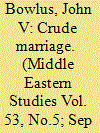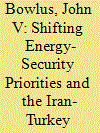|
|
|
Sort Order |
|
|
|
Items / Page
|
|
|
|
|
|
|
| Srl | Item |
| 1 |
ID:
153590


|
|
|
|
|
| Summary/Abstract |
Since the discovery of oil at Kirkuk in northern Iraq, oil has shaped relations between Iraq and Turkey, as the former needed markets and export routes to the Mediterranean and the latter reliable sources of supply. This article examines the origins of the Kirkuk–Ceyhan oil pipeline from northern Iraq to the Turkish Mediterranean coast, charting the period of Iraqi–Turkish economic rapprochement in the 1960s to the construction of the pipeline in the 1970s. It also seeks to add to our collective understanding of why transnational oil pipelines in the Middle East succeed or fail by examining the pipeline's operational record.
|
|
|
|
|
|
|
|
|
|
|
|
|
|
|
|
| 2 |
ID:
174149


|
|
|
|
|
| Summary/Abstract |
In the 1880s, Germany cultivated an alliance with the Ottoman Empire that led to a concession to build one of history’s most storied, diplomatically contentious, and financially challenging infrastructure projects: the Berlin-Baghdad Railroad. While Germany had many goals in pursuing the project, oil was the only way to make the railroad economic. Drawing on Ottoman archival sources, this article examines the policies and strategies of Sultan Abdülhamid II in relation to Germany’s attempt to develop Mesopotamian oil from German Emperor Wilhelm II’s visit to Istanbul in 1889 to the conclusion of Germany’s oil concession in 1906/7. It argues that Hamid pursued a pragmatic policy to develop and protect Ottoman oil from being dominated by the powers, especially the British Empire, and, in the process, seeks to reorient our understanding of great power interest in Middle East oil.
|
|
|
|
|
|
|
|
|
|
|
|
|
|
|
|
| 3 |
ID:
179080


|
|
|
|
|
| Summary/Abstract |
On January 31, 1969, Iran’s Shah Mohammad Reza Pahlavi met in Zurich with representatives from the British-American-French-Dutch-owned Iran Oil Consortium (hereafter the “Consortium”) to discuss a variety of issues, including the proposal to build an oil pipeline from Iran to Turkey. In a “dispassionate” tone, according to the second highest ranking official at the U.S. Embassy in Tehran, Minister-Counselor Nicholas G. Thacher, the Shah admitted that the pipeline to Turkey “was not one of his pet projects and [that] the validity of the line must be judged solely on economic grounds.” The Shah’s tepid support was due, ultimately, to his preference for other options to transit Iranian oil exports to Europe. Instead of committing to a landlocked pipeline through a single country, the Shah and Consortium preferred the flexibility offered by large seaborne tankers and the security of using a new pipeline in Israel that bypassed the closed Suez Canal.
|
|
|
|
|
|
|
|
|
|
|
|
|
|
|
|
|
|
|
|
|